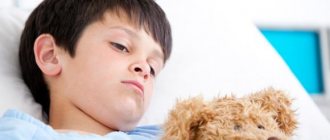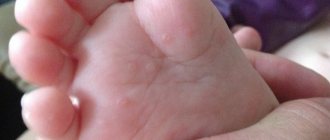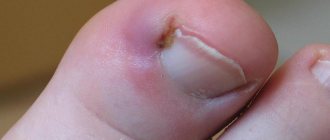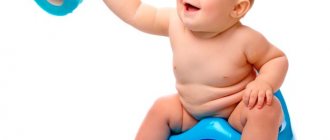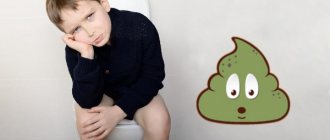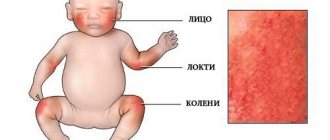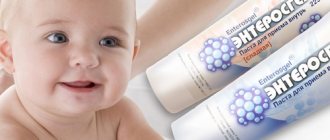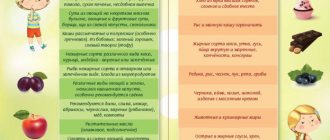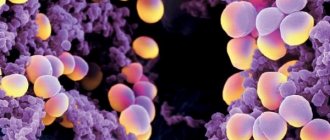In this article we will help you figure out what to do if your child sweats a lot. What reasons could be behind this, how does sweating differ in a newborn baby, at 4-5 months, at 6-7 years old, at 10-11 and in a teenager at 15, in what cases do you need the advice of a qualified specialist and how to prevent it? the baby, even if he runs a lot, began to sweat less.
Severe sweating in a child cannot be ignored; it is necessary to understand its causes.
If you are a responsible parent, then you should monitor the health of your offspring extremely carefully, and not only if you are concerned about excessive sweating in your child.
How healthy a baby is is determined not only by whether he is pale, sweats a lot, or has a high temperature. His mood, appetite, and sleep are no less important.
There can be many reasons why a child sweats a lot. Sweating is an extremely important indicator of his physical health. Starting from the age of 11-12 years, he enters puberty, and sweating can be either a variant of the norm or indicate various disorders. A three- to five-month-old child may sweat a lot due to whims, and a slightly older child may sweat a lot due to an increase in temperature when teething. And these are not all the causes of hyperhidrosis in children.
As we see, this problem occurs not only quite often, but in almost everyone. If the child does not sweat all the time, but from time to time, and there are no other alarming symptoms, then, in principle, there is nothing to worry about. However, a responsible parent should still know something about the characteristics of a child’s body, which sweats heavily for one physiological reason or another.
Your baby's skin characteristics
Skin is not only a cover, but also an organ of external and internal secretion, the largest in the human body. It performs a number of functions: barrier (separation of the external and internal environment) and exocrine (release of certain substances to the outside), as well as thermoregulatory.
If the baby sweats without even getting tired, it means that the skin is fulfilling its immediate purpose - through sweat it removes excess liquid, toxins and cools the body, and also cleanses itself.
Constant sweating in children, as in adults, may be a variant of the norm if a person has a lot of sweat glands from birth or they are much more active than average. This can be treated with the help of cosmetic operations, such as the introduction of Botox or Dysport, laser curettage, sympathectomy, but up to 18 years of age, all of them are contraindicated (and up to 25-30 years of age, unless absolutely necessary, it is better not to interfere with the body), and the only method of treatment will be strict maintaining good hygiene to combat excessive sweating.
Monitor your child's diet; spicy and fatty foods only worsen sweating.
If you notice severe sweating in a child that was not there before, pay attention to the following things:
- How many months or years old is your baby?
- How active is he?
- His temperature and what clothes you dress him in.
- What is included in his diet?
- Do you or other close blood relatives of your baby suffer from excessive sweating?
- His emotional background, whether he is crying, shaking, or jumping up sharply.
- Possible internal diseases.
Now we will reveal in detail the content and meaning of these factors, why children sweat a lot.
Memo to parents
Before any of the above procedures, the child must undergo a full medical examination! Necessary: biochemical blood test, urine test, it is necessary to exclude the possibility of hepatitis and other infectious diseases. A blood sample is given to test its ability to coagulate (that is, clot). An ECG and ultrasound of internal organs are also necessary. All this is necessary to completely exclude cancer.
Important! Without research, an operation is never, under any circumstances, carried out.
Two weeks before the date of the proposed intervention, a complete abstinence from fatty and heavy foods is necessary. It is necessary to stop prescribing medications that worsen blood clotting (aspirin).
Rehabilitation (its duration and ease of progress) depends on the specific characteristics of the body, the method of eliminating sweating, the condition of the child, etc. As a rule, the recovery period lasts at least one month. In any case, your attending physician will need to give specific recommendations and schedule appointments and examinations.
Your child's age
Quite an important thing. In the mother's belly, the baby does not need thermoregulatory function. Any formation of it begins at about the age of 1 month, it reaches maturity by 4-5, less often by 6 years, sometimes by 9. So if an infant begins to sweat a lot from time to time, and there are no other alarming symptoms, then there is no need to worry about There is no need to treat it with anything.
Until 2-3 years of age, the formation of the autonomic nervous system, which regulates autonomic functions in the body, is also completed, and at this age the child may sweat a lot from time to time. Apart from hygiene, he doesn’t need anything else. In adolescents under 15 years of age, hormonal levels change; the child almost no longer sweats a lot - this is also normal.
Treatment
Before treating excessive sweating, it is important to determine the cause. While the necessary tests are being carried out, parents can alleviate the condition of their infant and adult child as follows:
- The use of special antiperspirants based on aluminum chloride to suppress the growth of bacteria and eliminate the pungent odor of sweat. Not recommended for use in summer.
- The use of traditional medicine in the form of baths of oak bark, chamomile, string, sea salt.
- Physiotherapy in the form of iontophoresis.
- More careful hygiene: regularly shower with antibacterial soap; frequent change of linen; using only natural fabrics; use of baby powders, creams and ointments for sweating.
- Maintaining proper nutrition and diet with the exception of salty, spicy, fatty foods.
When eliminating sweating in children, preference should be given to natural remedies.
Clothing and temperature
Clothes that are too tight cause excessive sweating
Since, as we have already found out, a one-year-old child has imperfect thermoregulation mechanisms, special requirements are placed on the temperature in the room where he is located. The most suitable temperature for a child is 18-21 Celsius; within these limits he will not be either cold or hot.
Another important factor is air humidity, it should be around 50% (30% is acceptable for adults).
Ventilate the room every day and do wet cleaning at least once every two to three days.
The reason why a child sweats can also be clothes that are too thick or made of inappropriate materials. It is not recommended to wrap your child like an onion; he will sweat even in the cold.
Up to three years in the winter, it is enough to put on one more layer of clothing than you put on yourself.
The material from which the clothing is made is also of great importance. Synthetic fabric is dense, it prevents sweat from evaporating and air from cooling the skin. The baby finds himself in a steam room, in which he sweats more and more.
Preventing the problem
In order for newborn babies to feel comfortable and sweating to disappear, you need to try to create all the conditions:
- Be sure to monitor the temperature and humidity in the room.
- Newborn children should choose clothes and bedding only from natural fabric, without bright patterns.
- Strictly observe hygiene; it is recommended to bathe the child daily. It is useful to add decoctions of medicinal herbs such as chamomile, string, and oak bark to the bathtub.
- There is no need to wrap the baby up or swaddle him tightly.
- Breastfeeding should take place in the most convenient and comfortable conditions, mother and baby should take a comfortable position. The baby should grasp the nipple correctly.
If hyperhidrosis is detected, sedatives, immunomodulators, and vitamin and mineral complexes are prescribed. In cases of severe disease, special ointments, creams and tablets are prescribed.
Do not ignore preventive examinations with a pediatrician. Referrals are periodically given for blood and urine tests; newborn babies have head and waist measurements taken every month. These actions make it possible to suspect violations in time.
Hereditary factors
About eight percent of people have such a congenital body feature as either an increased number of sweat glands or their increased production. If dad or mom, or one of their parents belongs to such people, then the child’s sweating may be caused by a hereditary factor. We briefly mentioned the methods of treatment above, but they are for adults; children do not do any of this - they cannot.
Fruits and vegetables contain many vitamins and do not cause sweating
Your baby will make the decision about Dysport injections or a visit to a laser clinic himself when he grows up. Until then, teach him to carefully monitor his hygiene - after 12-13 years, when he enters adolescence, excessive sweating can bring him social complexes.
Why does a child's head sweat in his sleep?
Most often, the cause is the same rickets, or a viral infection and associated changes in body temperature. Such changes occur especially often with influenza or ARVI, after taking antipyretic medications. So that during illness the child does not experience problems with sweating during sleep, the temperature can not be lowered below 38.5 degrees at night; it does not pose a serious danger to life.
Another possible cause of night sweats is an allergy to pillows or duvets. Natural fluff can cause not only sweating in an allergic child, but also a runny nose, rashes on various parts of the skin, fever and even severe swelling.
However, you should not always sound the alarm: if no symptoms other than sweating are observed, the child may simply become hot when he sleeps. First, try lowering the temperature in the room or replacing the blanket with a lighter one.
You are what you eat, or your baby's nutrition.
If adults are greatly affected by what they eat, then what can we say about children. Sweating is provoked by spicy, fatty, fried foods, sweets, smoked foods, and some spices. For a one-year-old baby and a little younger, the cause of sweating may be new types of complementary foods or foods.
Pay attention to whether your baby is getting enough fruits and vegetables. They do not cause sweating and contain many, although not all, beneficial microelements.
The child should start giving meat from boiled poultry without skin. Also watch the amount of liquid; in hot weather, the baby should receive about one glass more water than usual.
Simple techniques to reduce sweating
There are some useful tips to help reduce scalp sweating. Firstly, you should be more careful when choosing hats. Try to choose exclusively models made from natural fabrics that do not disrupt the process of natural gas exchange. In the summer, try to wear loose-fitting Panama hats on your child, avoid baseball caps. They fit too tightly to the head, which creates additional difficulties. During sleep, your offspring should sleep exclusively on linen made from natural fabrics. Synthetics will only aggravate the problem, as it seriously impedes natural gas exchange.
https://youtu.be/mLlo9k8ZOVo
Secondly, you need to choose the right diet for your baby, completely getting rid of too heavy foods . The latter, putting extra stress on the digestive organs, provokes the development of severe sweating. You should strive to use only natural shampoos and not wash your child's hair too often.
Your baby's mood
If your child's sweating is accompanied by other unpleasant symptoms, consult a doctor.
The part of the autonomic nervous system—the sympathetic nervous system—that is responsible for sweating is also responsible for stress. Sweat glands begin to function more actively when a person is worried. Mood swings are common in young children, and they naturally become sweaty during them. Carefully monitor the emotional microclimate that is comfortable for the child.
External reasons
In most cases, the daughter or son sweats heavily due to the excessive efforts of the parents, who dress the baby too warmly or inappropriately for the weather. As a result, a one-year-old and older baby gets sick more often and coughs even in the summer. In order to prevent the child from overheating and increased work of the sweat glands, it is necessary to reconsider the compliance of such parameters with the norm, such as:
- temperature and/or humidity in the room;
- quality and/or convenience of things;
- the correctness of the shoes.
Pathologies
Sweaty hands and feet, as well as the rest of the body, are often caused by various diseases. When the temperature rises, children begin to sweat, and with some diseases the temperature drops like a crisis - very sharply, which causes even more profuse sweating. After your baby recovers from a cold or flu, he may continue to sweat for a while, about a week. This is due to the fact that sweating is necessary to remove toxins from the body, which accumulate a lot during the active fight of the immune system against the virus.
If excessive sweating is accompanied by other alarming symptoms and does not go away over a long period of time, you should consult a doctor. Diseases that cause severe sweating include:
- Rickets. Children often suffer from it in the northern regions of Russia, where there is little sun. The disease is associated with a lack of vitamin D, which is best absorbed in the sun. Symptoms of rickets include: first, the baby notices that the back of his head is sweating, and begins to vigorously rub his head on the pillows, which leads to the appearance of bald patches on the back of his head. The baby also becomes capricious and nervous, and his fontanelles slowly become overgrown. Subsequently, developmental delays and curvature of the legs in the shape of the letter X or O develop. Prevention of rickets - sunbathing and calcium and vitamin D supplements.
- Profuse sweating during teething, the sweat glands on the face also become inflamed and begin to work faster, this is always accompanied by profuse sweating.
- If hyperhidrosis gets worse, this may be a side effect of some medications you give your child. Read the instructions carefully.
- Excessive sweating can be caused by obesity, a problem that has made people very young. Fat is a natural “fur coat” that wraps the body, preventing heat from radiating outward. Therefore, plump children get hotter and sweat more.
- Defects of the cardiovascular and lymphatic system. They are not always noted on ultrasound during pregnancy. If you suspect your child has them, do not delay surgical treatment.
- Changes in hormonal levels. They can be not only age-related. In children, just like in adults, diseases of the endocrine glands occur - hyperthyroidism or thyrotoxicosis, diabetes mellitus, diseases of the adrenal glands. All this leads to hormonal surges and failure of thermoregulation systems, and consequently to hyperhidrosis.
Rickets
The first signs of the disease appear at the end of the second month of life. Severe sweating develops, and the sweat acquires a sour smell. The caustic composition of sweat secretion causes redness and irritation. An infant sweats more often at night. Sweat appears especially profusely on the head. Other symptoms:
- straining while eating, which is explained by constipation;
- anxiety, excitability;
- pronounced negative reaction to light and sound.
An illness in a one-month-old baby is easier to prevent than to cure. Preventive measures:
- regular walks in the fresh air, which should be longer in sunny weather;
- additional intake of vitamin D, especially in winter or in the absence of sun in summer;
- organization of proper nutrition;
- ensuring the child’s physical activity in the form of children’s gymnastics.
